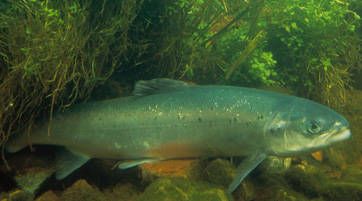Submitted by WDFW
The Washington Department of Fish and Wildlife is encouraging anglers who catch Atlantic salmon that escaped from a salmon farm near the San Juan Islands last Saturday to report their catch online.
Although anglers are not required to log Atlantic salmon on their catch record cards, state fish managers are requesting anglers report their catch online in an effort to track fish being caught.
The form for reporting can be found online at wdfw.wa.gov/fishing/salmon/atlantic_salmon_catch.php.
“We’re hoping to track how many Atlantic salmon have been recovered by sport anglers and how far those fish have dispersed,” said Ron Warren, head of WDFW’s fish program. “If you’ve caught one of these fish over the last few days, or if you catch one in the near future, please let us know.”
Warren noted the escaped Atlantic salmon are 8 to 10 pounds in size and are safe for people to eat.
WDFW also is deploying additional employees to assist with creel checks in the Bellingham Bay area to help collect data on encounters with Atlantic salmon.
Cooke Aquaculture notified the department of a net pen failure Aug. 19 that allowed Atlantic salmon to escape from the company’s Cypress Island location. The net pen held 305,000 salmon but the number of escaped Atlantic salmon is still undetermined.
The department is working with Cooke and other state agencies to determine the number of fish that actually escaped.
WDFW is responsible for monitoring fish diseases and shares regulatory authority for net pen operations with several other agencies, local governments and tribes.
Anglers must have a current fishing license and must also observe gear regulations identified in the 2017-18 sport fishing rules pamphlet.
There is no size or catch limit on Atlantic salmon. However, anglers may only fish for Atlantic salmon in marine waters that are already open to fishing for Pacific salmon or freshwater areas open to fishing for trout or Pacific salmon. Anglers also must stop fishing for Atlantic salmon once they’ve caught their daily limit of Pacific salmon in marine waters or their daily limit of trout or Pacific salmon in freshwater.



